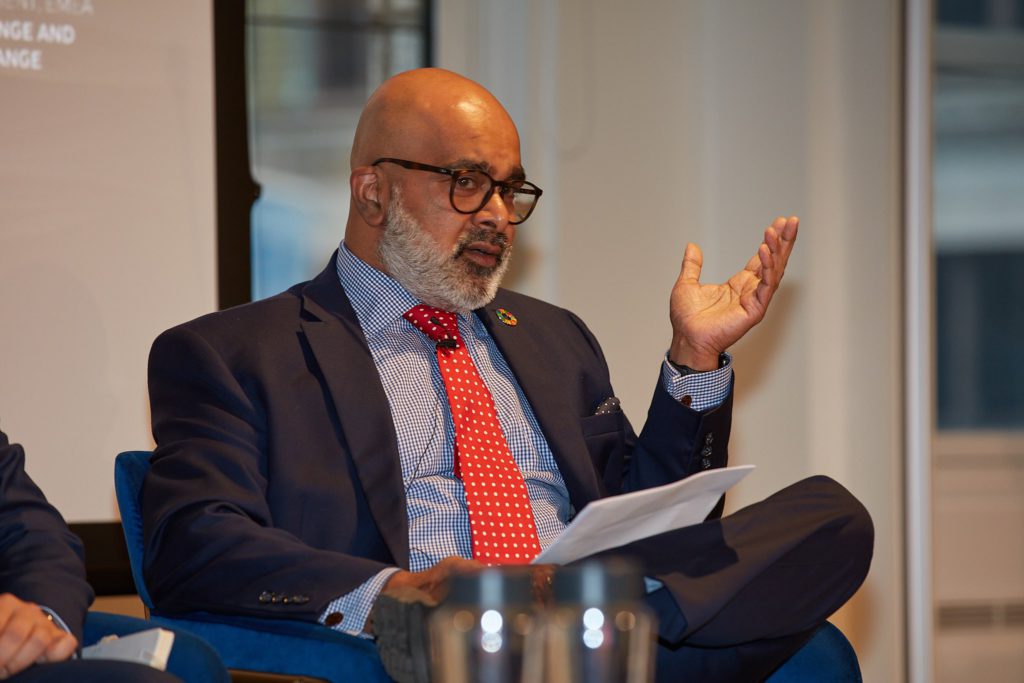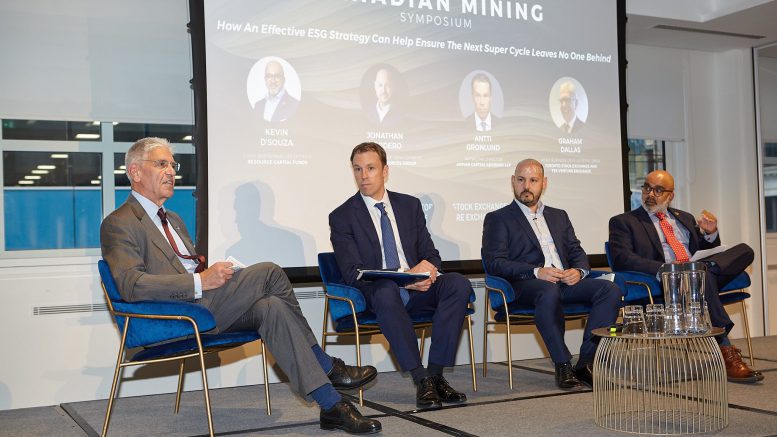The industry must confront its dark past of disasters to attract new investors and offer project stakes to local towns to improve environmental, social and governance (ESG) issues.
Those were some of the recommendations flowing from a panel on ESG sponsored by TMX Group at The Northern Miner’s Canadian Mining Symposium this month in London.
The main events affecting the general public’s attitude to mining are tailings disasters, human rights abuses, harassment and artisanal mining conflicts, panelist Kevin D’Souza, chief sustainability officer at Denver-based Resource Capital Funds, told the session on Oct. 12.
“We’re in an industry that’s made a lot of mistakes,” D’Souza said. “We have to own that. We’ve got to talk about it and say here’s what we’re doing about it. If we keep avoiding that conversation, we’re not going to attract new investments.”
The difficulty of financing projects is a leading concern among juniors as commodities such as gold outperform the shares of companies that dig it up. Some project developers view ESG as a way to improve the mining industry’s negative image and draw investors away from strong sectors such as technology stocks.

Indigenous equity
The panelists said successful ESG needs to be embedded in corporate culture from the top, seek achievements instead of ratings, be applied to local circumstances without a cookie cutter, avoid greenwashing and go beyond building schools and hospitals to help communities.
“The idea of having equity with Indigenous groups is going to happen at some point, probably in British Columbia first,” D’Souza said. “That’s going to move the needle.”
The term social licence is outdated, Antti Grönlund, managing director of London-based Appian Capital Advisory, said on the panel. In practice it becomes merely community toleration of a project when it should be about greater social integration and listening to opinions before invoking a plan, he said.
Improving the industry’s image requires convincing the public that pro-climate is pro-mining, said panelist Jonathan Cordero, head of corporate development at Eurasian Resources Group, which has projects in Kazakhstan, Brazil and a string of central African countries.
“The best projects in the world are in what we believe are difficult jurisdictions like Congo, Zambia and Zimbabwe,” Cordero said. “As long as we don’t come together and acknowledge that these countries that require the most attention get the attention, we will fail in our energy transition.”
Miners and investors must probe ESG strategies with four questions, D’Souza said.
1. Does the company view ESG as a value-creation driver? (Is it part of its business model or is it an add-on?)
2. Has the company determined what is truly material to them? (They must understand their risks and opportunities.)
3. Can they operationalize it? (Do they really do this on the ground or is it just on paper?)
4. Have they articulated their own story? (Do they control their own narrative?)
Industry motto
“We have to talk differently and stop just telling people how good we are in our own self-interest because literally that’s telling turkeys to vote for Christmas,” D’Souza said. “Otherwise, we’re going to be sitting here and again saying the same things: everyone needs us, but no one likes us.”
“That could be the motto of the industry,” moderator Graham Dallas quipped. He is head of business development for Europe, Middle East and Africa at the Toronto Stock Exchange, which is owned by TMX Group.
Cordero noted how Eurasian Group is deploying an autonomous ground vehicle in Saudi Arabia to take and analyze samples, a technology that could attract investors.
“We’ve seen a few examples where this happened, where explorers that have a stronger AI angle were able to tap into Silicon Valley, for instance.”
Similarly, some manufacturers have been showing consumers how minerals make up their products but first must be mined, Grönlund said.
ESG ratings are a blunt instrument that’s just somebody’s opinion, said D’Souza, who recalled working at Barrick Gold (TSX: ABX; NYSE: GOLD) when it boasted about giving X many dollars per ounce to the community but didn’t celebrate what was achieved. “It was crazy and meaningless” and wasn’t aligned with the company’s core values, he said.
ESG seems easy because everyone knows something about it, he said.
“Bit like cooking. We can all talk about it, but which one of us is a master chef?”


Be the first to comment on "CMS: How to fix ‘everyone needs us but no one likes us’"